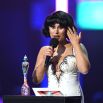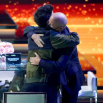Lollapalooza holds a yearly event where it releases a number of "early bird" passes for a mere $250. It releases the rest of the three-day passes the next day for the not-exactly-loftier price of $275. It's mostly sentiment and semantics at this point. All of the general admission passes will be snapped up just as quickly as their discounted brethren. The Chicago Festival could push admission prices higher and wristbands would still run out within an hour of availability. C3 Presents, the promoter behind the Midwest's biggest fest, hardly needs help in packing Grant Park.
The rest of the world's music festivals should be so lucky.
The success of the Coachellas of the world—focal points for a media frenzy, where celebrities and citizens rub elbows among otherworldly art installations—has inspired a frenzy of replicants around the world, desperate for that kind of attention. Nielsen reports that 32 million attend at least one music festival in the U.S. every year...but that human wealth doesn't get distributed equally. New players can struggle to fill their fields. That's where The Physical Network comes in. With a little effort and some good word of mouth, more than 65 percent of the company's clients sold out their events.
Liam and Callum Negus-Fancey, 22 and 25 respectively, don't consider their groundbreaking system a ticketing business but that's how the idea was born, with the brothers selling tickets to underage raves in their hometown of London. They noticed that a healthy amount of tickets moved, up to 90 percent, were then turned around and sold to friends by the original buyers. It was more than just a scalping scenario: The siblings realized that friends attending an event was often a more alluring factor than the performer.
The brothers had developed software for expanding beyond the physical tickets of their rave days, and set about targeting social media as a platform for moving excess tickets. The process works in two directions: The Network optimizes its results by finding the most "influential" individuals on Facebook, or those aiming to attend the festival can sign up. Both recruits work under the same premise however...turn around more tickets to your pals and reap the rewards accordingly. The most popular prize, of course, is free admission to the festival in question. Training to become an ambassador takes around two minutes.
"We quickly outgrew the events company," Liam says, on the phone during a visit to Los Angeles, part of the brand's expansion to the U.S. "[We] noticed festivals were needing help selling tickets, and they also wanted the demographic that we had."
Part of the appeal of ambassador networks for festival promoters is that they often represent the most loyal of its fan base, guaranteeing a stronger return for years to come.
Liam notes the first event the company handled was the London Electronic Dance (L.E.D.) Festival during 2010. The Physical Network moved 4,000 tickets through its servers. Fast-forward to 2015 and TPN has 4,000 ambassadors at Electric Zoo in New York City. Not 4,000 tickets sold; 4,000 people selling tickets.
"I can't release exact numbers but, let's just say, that they sold more tickets during that short span than any other ambassador/affiliate tool we have used for the entire year," says Michael Julian, director of marketing at Made Event, Electric Zoo's promoter. "Needless to say that we were very happy and teamed up with them again in 2015. Nowadays, our Electric Zoo Ambassador Network is powered by their technology and I consider it to be one of the top marketing tools we have available for selling tickets."
Julian touches on a point that Liam hammers on when discussing his company: The Physical Network is a marketing tool, not a ticketing tool. He emphasizes that hubs such as Ticketmaster sell the tickets themselves...TPN just gets them to the retailers. "We're partners, not competitors," he notes.
Festivals are enticed by the simple promise that they'll only pay for what they get out of it, with several plans to consider. TPN can manage the network of ambassadors for 10 percent of the ticket price, or the Street Team Plan, which allows the client to manage its own ambassadors with TPN making $1, plus 2 percent of face value, for every ticket sold.
The rapid growth and proven formula has made Physical popular among a growing number of promoters. One of the company's oldest partners is Bestival, an Isle of Wight event organized by noted DJ Rob Da Bank, who's also one of the Negus-Fanceys' biggest fans.
"The Physical Network have totally changed our model of how to sell tickets and are busy reinventing the wheel whilst so many other ticket sellers and agencies stagnate," he told Music Times. "I'm a huge fan of their ambassador scheme."
Part of the company's newfound popularity, or more likely its influence thanks to the tickets it's helped move, is events doing more than just offering free tickets to successful ambassadors of the brand. Bestival now hosts Temple Island, a side stage curated by those who moved the most passes on its behalf. Rob himself will play a DJ set in the tent when the festival opens in September.
Although the company does seem to attract more attention from EDM-based events—counting the Electric Daisy Carnival, Mysteryland and Spring Awakening among its partners—Physical also works with rock-oriented events such as Florida's Fort Rock and Welcome to Rockville, as well as festivals of more varied content, such as Life Is Beautiful. The surfeit of dance festivals stems not from his own rave background, Liam insists, but the simple truth that the genre is expanding more rapidly, and perhaps less tenably, than others.
"I guess there's a massive movement toward EDM at the moment, or dance, electronic," he concurs. "More often than not, new festivals are electronic. The electronic music market is booming. Naturally the Physical Network has associated to that. I wouldn't say that it's for any strategic reason. There are just more electronic festivals now."
One of the company's goals is to expand beyond the glut of EDM events and perhaps, soon enough, onto other ventures altogether. When asked about partnering for individual artist tours, Liam confirmed the company was in talks with several performers (although he wouldn't list names), and when asked about expanding into athletic events, he cited talks with a "Tough Mudder-esque" franchise.
"It's not something that's going to be tomorrow," he says, using a calendrical metaphor. "Right now we're looking at small festivals, large festivals, and that's our primary focus over the next six months...right now we're rolling out to New Zealand, Australia, Malaysia, South Africa...that's our primary focus at the moment."
The Physical Network may not be branching out from festivals tomorrow. But we can only imagine what next week holds for these siblings.
© 2026 MusicTimes.com All rights reserved. Do not reproduce without permission.




